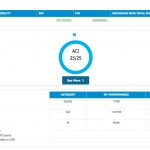NEW YORK (Reuters Health)—Subcutaneous belimumab improves outcomes in anti-dsDNA-positive hypocomplementemic patients with systemic lupus erythematosus (SLE), according to results from a Phase 3 randomized, controlled trial. Intravenous belimumab is approved by the U.S. Food and Drug Administration and the European Medicines Agency for the treatment of patients with active, autoantibody-positive SLE who are receiving standard…
Obesity Linked with Disability in RA
(Reuters Health)—Patients with rheumatoid arthritis (RA) may be more likely to become disabled if they’re obese, a U.S. study suggests. Researchers examined data on more than 25,000 patients with RA. Most were overweight or obese when they joined the study. Those who were severely obese were more likely to report some disability at baseline. Over…
Getting Past the Noise to Identify SpA
Objective: Low-grade bone marrow edema (BME) has been reported in the sacroiliac (SI) joints of 25% of healthy individuals and patients with nonspecific mechanical back pain, thus challenging the specificity and predictive value of magnetic resonance imaging (MRI) for the identification of early spondyloarthritis (SpA). It is unknown whether stress injury in competition sports may…

Rheumatology Research Foundation & NIH Program Bears Fruit
The Rheumatology Research Foundation has been actively involved with the NIH’s Accelerating Medicines Partnership for Rheumatoid Arthritis and Systemic Lupus Erythematosus (AMP RA/SLE) program, launched in 2014 as a public–private partnership to spur development of new therapeutic options for RA and lupus. Recently, the NIH released new datasets that will help clinical investigators accelerate therapies…
Supply & Demand: Where Will the Rheumatology Workforce Be in 2030?
According to the “2015 American College of Rheumatology Workforce Study: Supply and Demand Projections of Adult Rheumatology Workforce, 2015–2030,” the demand for rheumatologic care is projected to exceed supply of clinical adult rheumatology providers by 4,133 clinical FTEs by 2030. The research now being published estimates the baseline adult rheumatology workforce, as well as determined demographic and geographic factors relevant to the workforce. The research also highlights the need for innovative regional strategies to manage future access to and reduce barriers to care for rheumatology patients in underserved regions…

Rheumatology Research Foundation Welcomes New President, VP
The Rheumatology Research Foundation has appointed Abby G. Abelson, MD, with the Cleveland Clinic to serve as president. She begins a two-year term alongside the new vice president, S. Louis Bridges Jr., MD, PhD, with the University of Alabama at Birmingham (UAB). Drs. Abelson and Bridges are highly accomplished leaders in the field of rheumatology…

Providers Using RISE Have Advantage with 2017 MIPS Reporting
Hundreds of rheumatology providers across the country are finalizing submissions for the first year of reporting under the Merit-Based Incentive Payment System (MIPS). According to a presentation at the 2017 ACR/ARHP Annual Meeting in San Diego, providers that participate in and submit through the Rheumatology Informatics System for Effectiveness (RISE) Registry are poised to perform…
The Science Behind Biosimilars
Although six biosimilar agents have now been approved by the U.S. Food & Drug Administration for use in rheumatology, scientific, clinical, economic and prescribing questions about the use of biosimilars abound. In fact, at the 2017 ACR/ARHP Annual Meeting in San Diego, Joseph Huffstutter, MD, a rheumatologist in private practice in Chattanooga, Tenn., said that…

Chronic Pain Research Probes Neurologic Pain Pathways, Biomarkers
With the aid of increasingly sophisticated neuroimaging technology, research into how the brain activates and changes in patients with chronic pain is delivering fascinating information that will hopefully pave the way to tailored, individual treatment of chronic pain. Over the past several years, data from neuroimaging studies have provided a new understanding of what occurs…

DADA2 Research Reveals Mechanisms & Possible Gene Therapy
SAN DIEGO—An increasing number of patients is being identified with deficiency of adenosine deaminase type 2 (DADA2); fortunately, researchers and clinicians continue to better understand the genetic disease as well, experts said in a session at the 2017 ACR/ARHP Annual Meeting Nov. 3–8. The childhood-onset disease involves loss-of-function mutations to the CECR1 gene (i.e., cat…
- « Previous Page
- 1
- …
- 38
- 39
- 40
- 41
- 42
- …
- 130
- Next Page »